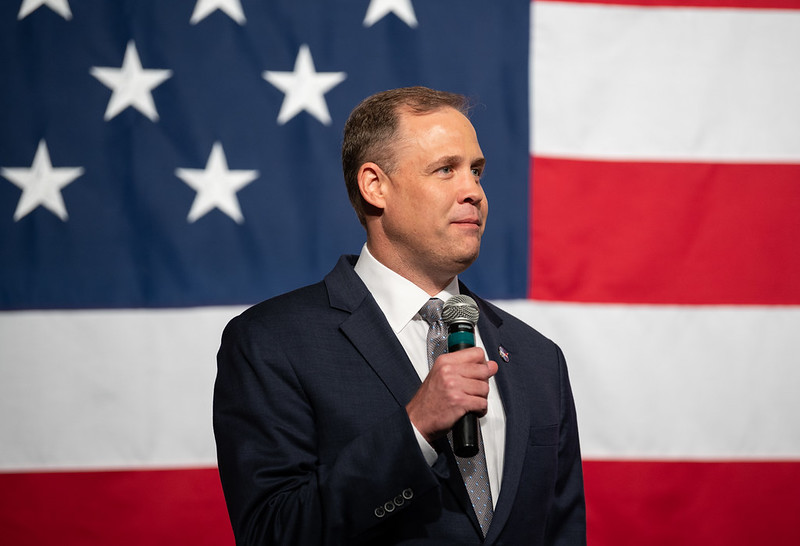Lawmakers Grill NASA Chief on Moon-by-2024 Budget, Schedule
"I don't want to go to the moon by taking money from people who can't afford to survive in this society," Serrano said.
A key group of congressional budgeters have big questions for NASA chief Jim Bridenstine about his moon-landing goals — and he doesn't have the answers they want.
Bridenstine and a deputy testified at a hearing today (Oct. 16) run by a subcommittee of the House Appropriations Committee about funding NASA's Artemis program, an effort to land humans on the moon by 2024. The agency requested an additional $1.6 billion for the now-current fiscal year late in the budgeting process, which the subcommittee hasn't had a chance to evaluate until now. And the subcommittee members would like the full program estimate before they decide on that extra money.
"NASA has not provided the committee with a full cost estimate despite repeated requests," Rep. Jose Serrano, D-N.Y., said. "Since NASA has already programmed the lunar landing mission for 2028, why does it suddenly need to speed up the clock by four years, time that is needed to carry out a successful program from a science and safety perspective? To a lot of members, the motivation appears to be just a political one, giving President Trump a moon landing in a possible second term, should he be re-elected."
Related: Will Private Companies Beat NASA to the Moon?
The $1.6 billion request itself didn't raise many specific questions — but a major topic of the nearly two-hour hearing was what would come next. Multiple subcommittee members pressed Bridenstine for details about budgetary needs beyond next September, for fiscal years 2021 through 2024.
NASA doesn't have those numbers right now and won't soon, Bridenstine reiterated. Earlier this year, in June, Bridenstine told CNN that returning astronauts to the moon by 2024 could cost between $20 billion and $30 billion, although that number was not final. Bridenstine has also disputed reports that the cost of Artemis could reach $8 billion per year for five years, or about $40 billion.
On the first request, from Serrano, he promised to provide the subcommittee members the details "as absolutely soon as possible" and guaranteed they would be available by the time of the agency's next full budget request submission, in February.
Get the Space.com Newsletter
Breaking space news, the latest updates on rocket launches, skywatching events and more!
Later in the hearing, he referred representatives repeatedly to that February date as to when the subcommittee members could expect full budget estimates for the program and a detailed schedule of milestones leading to the 2024 landing. "We want to give you those numbers," Bridenstine said. "We're not ready just yet, but certainly we still want to move forward."
Bridenstine also suggested the House follow the same approach to the dilemma that the Senate did, "fencing" the 2020 request based on what those numbers turned out to be. He also appeared to lay the groundwork for justifying large budgets early in the program. "If we go inexpensive early, then the likelihood is that cost goes up over time," Bridenstine said.
The conversation touched on NASA's plans to rely on commercial partnerships, including a detailed discussion of which rockets might be able to launch hardware to facilitate the crewed landing; Bridenstine argued that the astronauts themselves needed to launch on a NASA SLS rocket. But he defended the partnerships and expressed confidence in NASA's capacity to oversee their work.
"I think at this point, we're in good shape," Bridenstine said. "If our budgets do go up and we have more under development, we could need more support."

The subcommittee also touched on a clause in the supplemental budget request that would allow NASA to shuffle money between different programs in order to fund Artemis. Rep. Matt Cartwright, D-Pa., cited proposed cuts in the agency's requests for science and education efforts, which Congress reversed for the 2018, 2019 and 2020 budgets, and implied concerns that the clause would give NASA the authority to execute those cuts unilaterally.
Bridenstine, as he has in the past, emphasized that moving money from NASA's science or space station allocations wasn't acceptable; such an approach would be too politically damaging to the program. Instead, he wants Artemis appropriations to be additions to NASA's budget.
But unlike Bridenstine, the subcommittee members have to deal with appropriations across the federal government.
"This is not just about finding the money; it's about where this president is known to go find moneys when he needs them," Serrano said early in his questioning, referencing concerns the administration would try to pull the money from programs like Pell education grants and food stamps. "I don't want to go to the moon by taking money from people who can't afford to survive in this society."
- NASA's 2024 Moon Goal: Q&A with Human Landing System Chief Lisa Watson-Morgan
- Putting Astronauts on the Moon in 2024 Is a Tall Order, NASA Says
- Accelerating Moon Landing to 2024 May Make It More Achievable, NASA Chief Says
Email Meghan Bartels at mbartels@space.com or follow her @meghanbartels. Follow us on Twitter @Spacedotcom and on Facebook.
Join our Space Forums to keep talking space on the latest missions, night sky and more! And if you have a news tip, correction or comment, let us know at: community@space.com.

Meghan is a senior writer at Space.com and has more than five years' experience as a science journalist based in New York City. She joined Space.com in July 2018, with previous writing published in outlets including Newsweek and Audubon. Meghan earned an MA in science journalism from New York University and a BA in classics from Georgetown University, and in her free time she enjoys reading and visiting museums. Follow her on Twitter at @meghanbartels.









